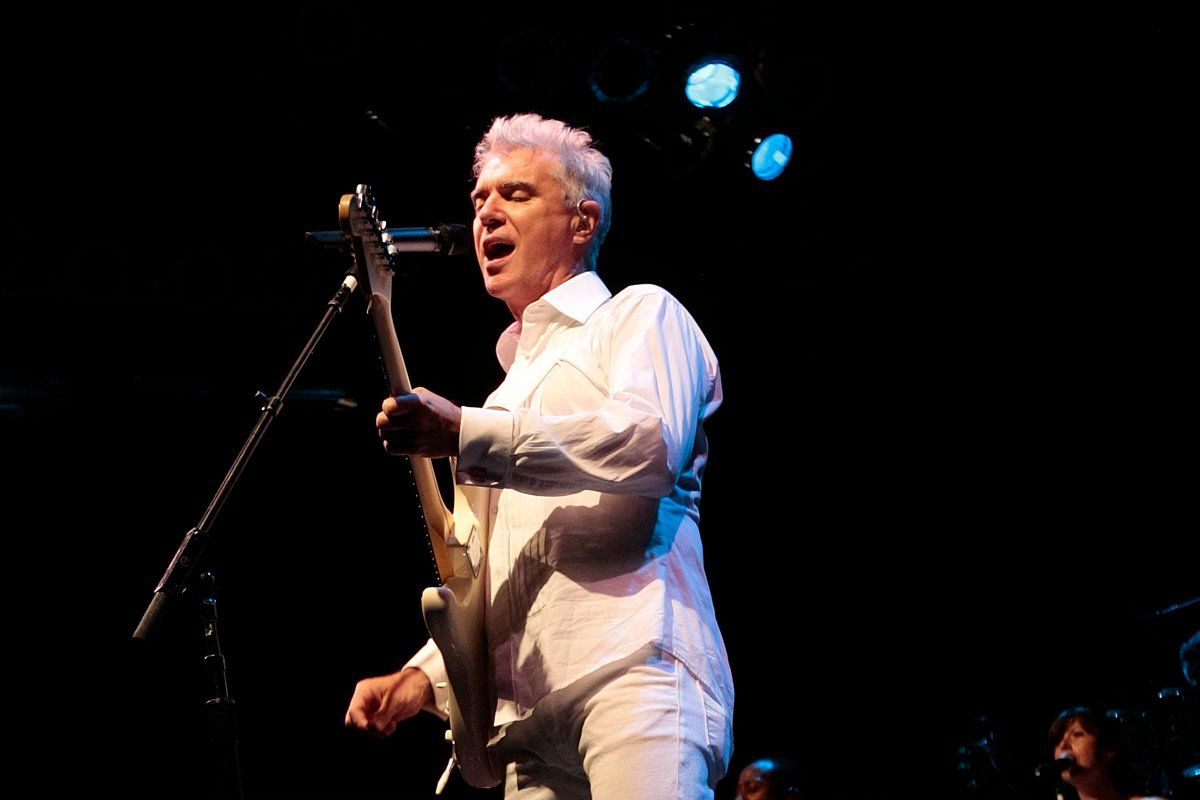
Music fascinates David Byrne. He's captivated by questions about how it's played and recorded, who listens and under what circumstances. Not much gets by him.
"I rented a car the other day, and just flipping through the channels, I thought, oh, my God, there's a niche for this and this and this! It's just mind-boggling."
His voice is softer offstage, playfully animated and speculative, but with enough echoes of his singing persona's familiar herky-jerky rhythm to leave you feeling like you're talking with "Psycho Killer"'s older, cooler brother. The arresting thing, though, is not how he says things but the surprising turns his reasoning takes.
So instead of seeing all those stations as evidence of social fragmentation, he sees community. "It makes you a member of a tribe," he says with an almost wondering air. "And your taste in music ties you all together. That need is almost more important than the music itself."
Then he laughs. "Of course, if you have musical taste like mine that covers a lot of different genres, it might be pretty hard to find people with similarly eclectic tastes."
Sitting in a conference room at his downtown Manhattan office on a recent summer day, he was dressed for the heat wave outside in white jeans, T-shirt, and flip-flops. He looked like a man on vacation who long ago stopped worrying about trying too hard.
Why should he? At 60, Byrne already has the résumé of five normal people. Over the course of four decades, changing personas faster than most men change ties, he has flourished as a musician, visual artist, film director, and author, and he has collaborated with everyone from Twyla Tharp and William Eggleston to Caetano Veloso and, most recently, St. Vincent. A musical he worked on with Fatboy Slim called Here Lies Love, about Imelda Marcos, will premiere in New York next year.
Now he has decided to write about it all—a lot of it anyway—in How Music Works. Idiosyncratic, informative, and drily funny, his book is neither the typical aging rock star's autobiography nor a how-to about performing or songwriting. Aimed at a general audience, it grapples with the ways music is shaped by technology, venue, and the expectations of its audiences. A book that no one, certainly not a working musician, has ever thought to write before, it would be invaluable even if it weren't top drawer. But just so we're clear, it's terrific.
"People tend to think a piece of music is the way it is because that's the way the musicians wanted to express what they had to say," Byrne says. "And I'm saying that there are an awful lot of other factors molding the finished product."
Chief among those factors are recording technology (the convention of the three-minute pop song resulted from the fact that 78s could only contain that much music); venue, be it concert hall or nightclub ("the venue and its policies make a music scene happen as much as the creativity of the musicians"); the business of contracts and royalties; and the social ties forged—and ruined—by music.
It's a lot to take in, but Byrne's a more-than-lucid guide. Musically speaking, he's a democrat impatient with hierarchies. Decrying the snobbery gripping contemporary classical audiences, he argues that "people used to bring food to the opera and talk and clap. If they really loved an aria, they would yell out for it to be sung again. I'm more with that. When did the Cone of Silence get dropped down?" But rock fans can be just as snobby: "Sometimes there's the feeling in downtown music that if it's pretty, it's bad. The noisier it is, the more profound it is. So it seems like every group has its own set of rules designed to exclude a certain set of listeners."

The one issue Byrne is unequivocal about is the primacy of live music, in which, he insists, lies a measure of our salvation, whether played on the front porch or the concert stage. "I think there's going to be a big resurgence of people hearing music live. As people become more isolated in front of their screens, they'll look for more excuses to get together. Music's a good excuse for that."
Uncommon Knowledge
Newsweek is committed to challenging conventional wisdom and finding connections in the search for common ground.
Newsweek is committed to challenging conventional wisdom and finding connections in the search for common ground.
About the writer
To read how Newsweek uses AI as a newsroom tool, Click here.





